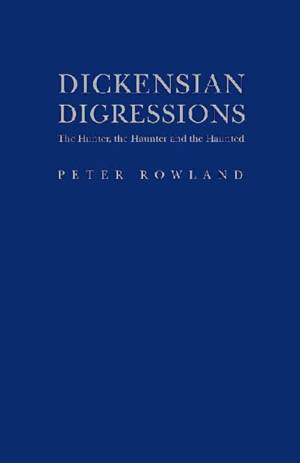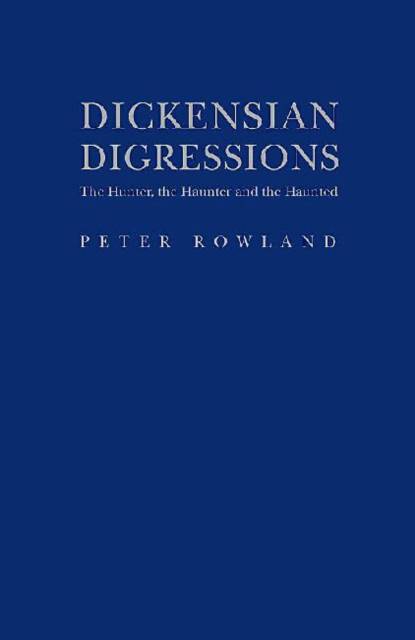
Bedankt voor het vertrouwen het afgelopen jaar! Om jou te bedanken bieden we GRATIS verzending (in België) aan op alles gedurende de hele maand januari.
- Afhalen na 1 uur in een winkel met voorraad
- In januari gratis thuislevering in België
- Ruim aanbod met 7 miljoen producten
Bedankt voor het vertrouwen het afgelopen jaar! Om jou te bedanken bieden we GRATIS verzending (in België) aan op alles gedurende de hele maand januari.
- Afhalen na 1 uur in een winkel met voorraad
- In januari gratis thuislevering in België
- Ruim aanbod met 7 miljoen producten
Zoeken
€ 46,45
+ 92 punten
Omschrijving
Two major Dickens studies, each of them breaking fresh ground, vie for attention in this absorbing volume. The first explores the extent to which Charles Dickens inherited the mantle of Charles Lamb. It demonstrates how heavily, as a 'hunter', he drew upon his predecessor's work for inspiration, adopting Elia's themes and mannerisms and virtually taking his place on the English literary scene -- even to the extent of inheriting John Forster as his closest friend and confidant. Charles the Second followed very closely in the footsteps of Charles the First in every respect, for Lamb's swansong, The Last Essays of Elia, appeared at the beginning of 1833 and the very first sketch emanating from Boz appeared at the end of that year. Lamb's pervasive influence is detected not only in the Sketches and Pickwick Papers but also in later novels such as David Copperfield and Our Mutual Friend, as well as the peregrinations of The Uncommercial Traveller. (And it is shown how the opening scene of Great Expectations was inspired by a chapter in Mrs Leicester's School, written by Lamb's sister). The second major study explores the strained relationship between Dickens, the leading novelist of the day, and T.B. Macaulay, the leading historian of the day. It pinpoints the latent simmering animosity and tensions between the two men over a period of twenty-five years and the extent to which their views differed on current issues, as well as celebrating the few occasions on which they were able to join in common cause. (Carlyle, the favorite historian of Dickens, and Thackeray, a close friend of Macaulay, have peripheral parts to play in this study.) Other research topics include a search for Bob Fagin, the prototype (in nomenclature terms) of the villainous Jew in Oliver Twist; the revelation of a public letter addressed to Maria Beadnell, Dickens's first love, advising her to keep her distance, and reflections on how H.G. Wells blatantly managed to produce an up-dated version of David Copperfield which went undetected. Research is dvoted to the extent to which Dickens truly believed in ghosts and the manner in which his spirit apparently contacted Sir Arthur Conan Doyle... in order to explain how The Mystery of Edwin Drood was intended to end. (In which connection, the extent to which Sherlock Holmes became involved in the case is examined -- and there is also a 'Droodian fragment' from an unexpected source to take into account, fully the equal of the celebrated 'Sapsea fragment'!) Peter Rowland is wellknown in the field of Dickens studies. He is in the unique position of having, in effect, completed both the books which Dickens left unfinished -- his autobiography (published as My Early Times, 1988 and 1997) and his final novel (published as The Disappearance of Edwin Drood, 1991). His most recent work has been a biography of 'Lanoe Falconer' (Mary Elizabeth Hawker), Academica Press, LLC 2009.
Specificaties
Betrokkenen
- Auteur(s):
- Uitgeverij:
Inhoud
- Aantal bladzijden:
- 326
- Taal:
- Engels
Eigenschappen
- Productcode (EAN):
- 9781936320073
- Verschijningsdatum:
- 15/12/2010
- Uitvoering:
- Hardcover
- Formaat:
- Genaaid
- Afmetingen:
- 155 mm x 231 mm
- Gewicht:
- 408 g

Alleen bij Standaard Boekhandel
+ 92 punten op je klantenkaart van Standaard Boekhandel
Beoordelingen
We publiceren alleen reviews die voldoen aan de voorwaarden voor reviews. Bekijk onze voorwaarden voor reviews.









